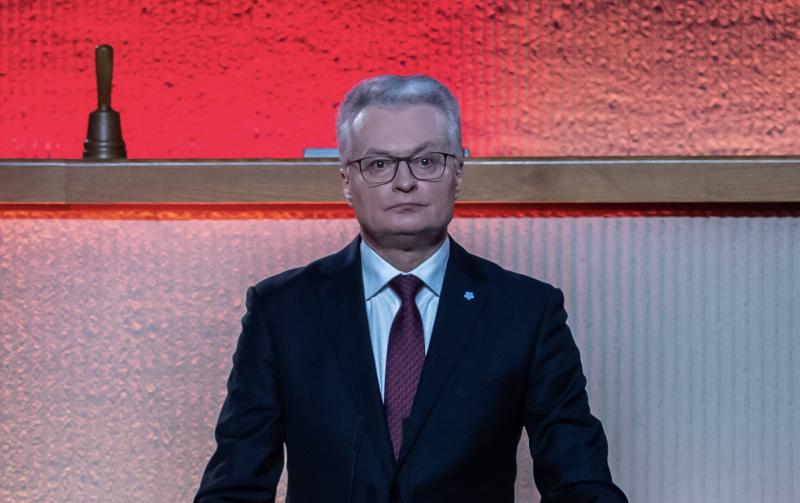Penki lyderiai su Nausėda priešakyje ragina neleisti Kremliaus režimui perrašyti istorijos
Autorius: Ekspertai.eu Šaltinis: https://ekspertai.eu/penki-lyd... 2022-07-23 20:58:00, skaitė 355, komentavo 13

Gerovės valstybės kūrėjas Gitanas Nausėda kartu su Rumunijos prezidentu, Estijos, Latvijos, Lenkijos Vyriausybių vadovais laišku kreipėsi į Europos Vadovų Tarybos (EVT) Pirmininką Charles‘į Michelį, Europos Komisijos (EK) Pirmininkę Ursulą von der Leyen ir ES Tarybai pirmininkaujančios Čekijos premjerą Petrą Fialą dėl istorinės atminties išsaugojimo.
Lietuvos, Rumunijos, Estijos, Latvijos ir Lenkijos lyderių laiške teigiama, kad Kremliaus režimas siekia perrašyti istoriją, ją pakreipti sau tinkama linkme ir naudoti kaip agresijos prieš suverenias valstybes pateisinimą.
Laiške akcentuojama, kad šis klausimas ypač aktualus Rusijos karo Ukrainoje kontekste intensyviai naudojant istoriją propagandos tikslais.
„G. Nausėda, K. Iohannisas, K. Kallas, K. Karinis ir M. Morawieckis ragina ES institucijas imtis lyderystės išsaugant istorinę atmintį ir neleidžiant Rusijos režimui manipuliuoti istoriniais faktais“, - skelbiama Prezidentūros pranešime visuomenei „Penkių ES valstybių lyderiai paragino ES institucijas skirti didesnį dėmesį Europos istorinės atminties išsaugojimui“.
Tai daryti siūloma sukuriant mokymo programas moksleiviams, suteikiant deramą politinę ir finansinę paramą Prahoje įsteigtai Europos istorinės atminties ir sąžinės platformai, užbaigiant įgyvendinti memorialo totalitarinių režimų aukoms atminti Briuselyje projektą bei stiprinant kovą su dezinformacija.
Laiško turinį Prezidentūra skelbia tik anglų kalba:
„Joint letter on European memory
July 22, 2022
Dear Colleagues,
The brutal unprovoked and unjustified war of aggression of the Russian Federation against Ukraine signals about the rise of authoritarianism that neglects and even seeks to destroy the international rules-based order. This is an alarming reminder of not very distant past, notably the crimes committed by two cruel totalitarian regimes of the 20th century in Europe – Nazism and Communism.
The background and the roots of the current Kremlin regime ideology represent, in many cases, a reflection of the predecessors of recent Russia: the USSR and the Russian Empire. Russia has never condemned the crimes of the Soviets and its current leadership openly tolerates and even enthusiastically supports the Soviet legacy. There is a need to strengthen efforts on the EU level to fight the attempts of Russia to rewrite the history and use the narratives of totalitarian regimes in the context of war against Ukraine, by using legal, political and awareness raising instruments. Without an accurate, honest and comprehensive assessment of the past, we will not be able to effectively prevent future crimes on our continent or investigate the current ones in Ukraine.
The democratic world has decisively condemned the Nazi regime and brought to justice its leaders and perpetrators. The bitter lessons of the Nazism and the crimes perpetrated by the regime have become an obligatory part of teaching about the history in our educational systems. At the same time, the memory and knowledge of Soviet crimes have yet to find their rightful place in the consciousness of the Europeans.
Today more than ever clear and visionary leadership is needed, to promote the European Remembrance narratives across the whole EU, which in the end should become a part of all Member States national educational programs. The EU is best positioned to take up this coordinated role, and such a gesture would also be timely and highly relevant, in the light of an unprecedented level of Russian disinformation and misinformation, including on issues of the European history.
In the recent years, important steps have been made on the European level by establishing the Platform of European Memory and Conscience. The EU could do more by providing the Platform with necessary political and financial resources. The establishment of a Pan-European Memorial for the Victims of Totalitarianism in Brussels would be a very important step in ensuring proper remembrance of crimes committed by totalitarian regimes, including the Soviet one, in our awareness-raising efforts in order to prevent similar crimes and to stop them in Ukraine, and in paying our tribute to the victims.
We very much count on your personal engagement and support for these initiatives which could be addressed in the EU Council.
Gitanas Nausėda,
President of the Republic of Lithuania
Klaus Iohannis,
President of Romania
Kaja Kallas,
Prime Minister of the Republic of Estonia
Krišjānis Kariņš,
Prime Minister of the Republic of Latvia
Mateusz Morawiecki,
Prime Minister of the Republic of Poland“